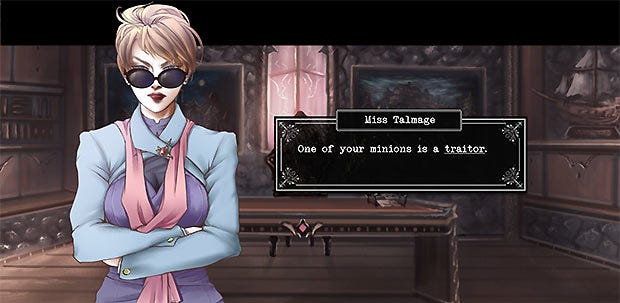Into The Black Closet
Remaking High School Experiences
As I send Alberta to detention and arm one of my subordinates with a baseball bat to ensure she’s maximally intimidating, a thought intrudes on the tightly focused stream of calculations and strategizing that defined my time with Black Closet [official site]: “Is this really what my ideal high school experience looks like?”
For the trans woman who plays games like this or Gone Home there’s a melancholic note of nostalgia behind every move: a longing for the childhood or the girlhood you never had, all the while recreating it in digital pantomime to weave a sense of memory for a never-happened history. I often think about what my life would have been like if I had been able to be out as a young woman in high school and been able to redirect all the energy I’d wasted battling dysphoria back into my schoolwork and planting the seeds of my career.
I might’ve been a young woman like Elsa Jackson, President of the Student Council at St. Claudine’s Academy for Girls.
As the player, your challenge in Black Closet is to maintain the reputation of the school by choosing the right team members to investigate a series of potential scandals, matching their stats against tasks such as intimidating and stalking your classmates, and covertly searching their rooms for evidence. At weekends however, you have to decide which of your team to socialise with, inviting them to tea and navigating strained conversations in order to keep them on your side. If you struggle at any part of this, your reputation among students and school staff will dip, and you risk becoming a scapegoat for the scandals you failed to prevent.
You navigate these challenges by playing as Elsa, the character whose eyes the player looks through from start to finish. Elsa is an “upstart” with the “wrong” name but profoundly smart and ambitious, who constantly battles the sneers and whispers of old money. She rose to become class President and direct her fellow councillors (or minions, as the game aptly refers to them) on various cases and investigations for the school.
Elsa reminds me a bit of my younger self, that lonely working class Puerto Rican kid who had top marks in her middle school class and had to jostle for place in an elite high school where her classmates, whose parents had wings of prestigious colleges named after them, lived on Park Avenue and Riverside Drive rather than in the South Bronx.
The difference between Elsa and I, of course, is that while I did acceptably in high school, I never stood out and pole-vaulted my way to the front. Dysphoria is like an energy-hungry forcefield that bleeds you dry of ambition. Elsa doesn't have to deal with that; she is who I wanted to be in high school. Stylish, prim and powerful, unflappable, clearly filling the role of a professional in all but name.
Games like this have that dollop of wish-fulfillment for many trans women (the usual caveat: I cannot speak for all of us). But Black Closet was the first to drag my nagging doubts front and centre. Much about the game lives up to its claustrophobic title, after all. This is a game where the student council wields something tantamount to absolute power, with the authority to search rooms, harass and detain students, suspend and expel them, and otherwise manipulate the intricate web of social strings that guide the school’s populace. It’s an ugly business, which compels one of your freshman subordinates to remark early on that she feels the council’s actions were immoral.
There is a reason for this. Games made by Hanako, the developers of Black Closet, are games that do not take their conceits for granted. But it takes a good deal of digging to fully comprehend the situation and by the end of it all you’re complicit in making the wheels of the school turn. Honestly, I felt guilty.
How else to feel after censoring student art because it depicted nudity or challenging themes about drugs? How else to feel after expelling a goth because she wouldn’t stow her feelings after being constantly picked on? The reputation of the school comes before all else, but even the opinion of the students (represented by a separate meter) is hardly the arbiter of virtue. Each system of valuation is a sea of moral grey.
The game makes a brilliant statement about politics; no matter how powerful you are, you always serve two masters: systems and structures. You can only bend them all so much before it comes tumbling down on top of your head.
While student councils this powerful are only common in fiction, there’s some truth in the game’s conceit of high stakes girlhood. Georgina Bensley, the infinitely creative mind behind Hanako Games, says that Black Closet was inspired in part by her own experiences at a religious all-girls school. “I attended a very small school, with a graduating class of less than 40 people. Everyone knew everyone,” Bensley told me. “I'd been there since I was four, I'd never known anything else. Expulsion might as well have been execution - the me of that time couldn't conceive of any other life. That made everything that happened feel very high-stakes.”
The stories she told me about delicate reputations and scandal, collective punishment and razor sharp battle lines drawn between girls and censorious teachers, all clearly inspired the various cases and dramas in Black Closet. In describing one incident from her youth involving a break-in, Bensley recalled that “they knew who the culprits were from the very beginning, but they dragged the investigation out for weeks trying to get people to confess for school-board-politics reasons.”
Such malevolent politicking is the basis for Elsa Jackson’s cynical world.
My own youth seemed to have presented a choice of evils: being out as a girl in high school and having to endure all this (only to, perhaps, end up like that hapless goth I had to expel), or living with dysphoria, hating myself, and underachieving as a result.
Just as there are many possible futures, there are an equal number of possible pasts in the nebulae of speculative yearning. Had I transitioned sooner, or had I been born cis, my options would not have solely been limited to a St. Claudine’s style experience. Bensley herself pointed out that her adolescence was uniquely hued by her academy years, in a way that any student, regardless of gender, who attended a public school of thousands would find harder to comprehend.
Thus, my playthrough of Black Closet constituted a possible history, but not the only one. Throughout the game I found myself relating to the girls who felt variously trapped, chafing against the dull repetition of their gilded cages. Mallory, the outsider who abandoned her nickname of M.K. to fit in with the upper class “belles” of the academy; Althea, the flaming fey who wanted to explore a world that couldn’t contain her; Vonne, who secretly longed to be an astronaut, not the doctor she was being raised to be; Rowan, who faded into the onyx background as surely as I often did in high school.
I realised that we weren’t so different, these “belles” and I; in spite of our vastly divergent gender histories, there was a sickness in the entire experience of being churned through a school system that left scars and painful longings regardless of gender. I already knew this intellectually, I could hold forth on the subject as a sociologist, but Black Closet enabled me to stare it in the face and feel it in my bones.
I mourned the girlhood I did not have, yes, but also the inhumanity that grinds us all down because of how we’ve industrialised our childhoods, rendering school an institution that binds us and leaves us with only strategic games played against one another as a possible escape. Whether cis or trans, boy or girl, we have to take it.
Black Closet excels in demonstrating the nature of that evil and providing a tableau of moral compromises. There are ways in which Elsa and her underlings can keep their virtue, to be sure, but not without policing the virtue of other young women in aggressive ways. Was this what I really wanted in high school? Was the game an exercise in revenge for me? Having all that power over my erstwhile wealthy and spoiled tormentors, and using it to show them up, punish them, and make them love me in the end? That’s definitely a fantasy the game can satisfy with its sometimes cynical take on student government.
But the game’s complicated web of relationships between profoundly human characters also punctures the various misogynist stereotypes that clutter around most teen dramas. Bensley is adept at writing characters who at first blush appear to be tropes before the branches of her visual novels reveal them to be much, much more interesting than that. Vonne, your diligent lieutenant, can take very different emotional paths based on your relationship with her: falling in love, remaining friends, expelled as a traitor to the school, or locked in a toxic possessive relationship, each spooling out from how you interact with her amid the manilla-enveloped official theatrics of the school year.
That, too (for good and for ill) was something I did not quite get to experience in high school, where my relationships were conducted through a gauze that obviated meaningful connection.
But there are happy endings, both in Black Closet and in real life. Vonne, the dutiful sci-fi and roleplaying geek who wants to explore the stars, also reminds me just a bit too much of my own partner (and I suspect she’d say Vonne reminds her of me). We may not have been bound together by the uniformed trials of high school government, but we found a way; each of us comes from a past littered with teenage wreckage that was never made for an ivy league college application. But we still endured.
You find a way to become the Elsa you need in your own life as a trans woman, I think. Black Closet reminded me, in its enchanting way, that I should be content to leave the past in the past and just sit back and enjoy the simulated darkness. A history that never was.














